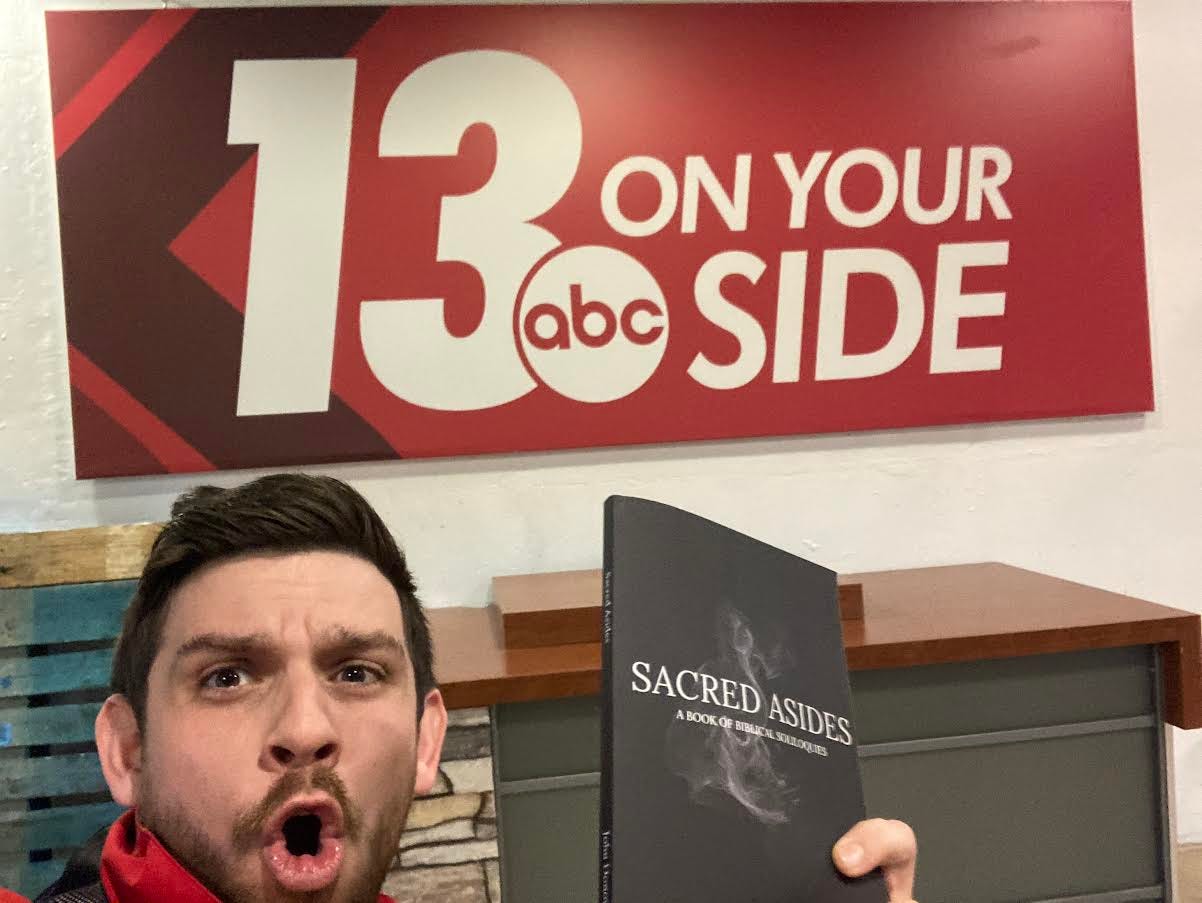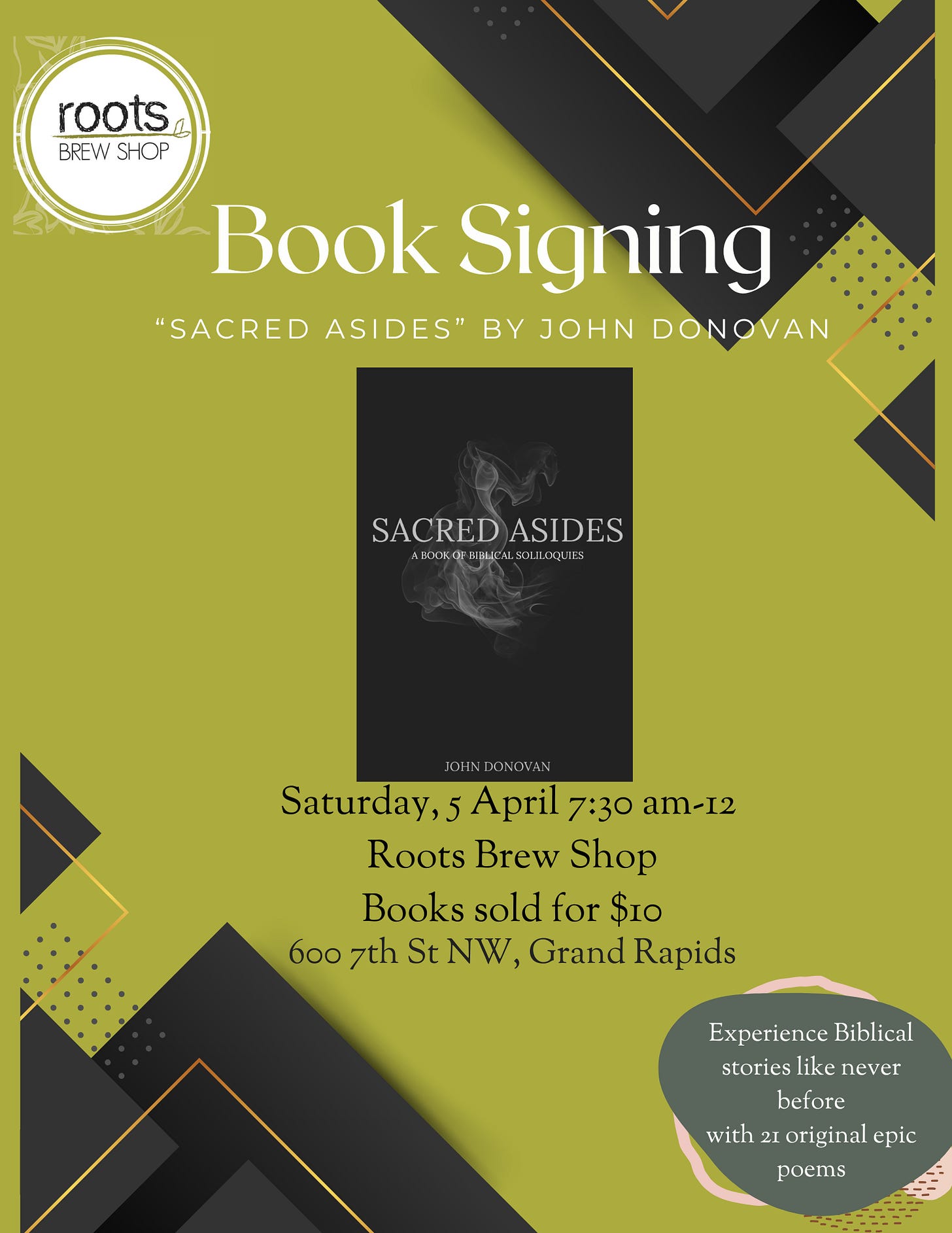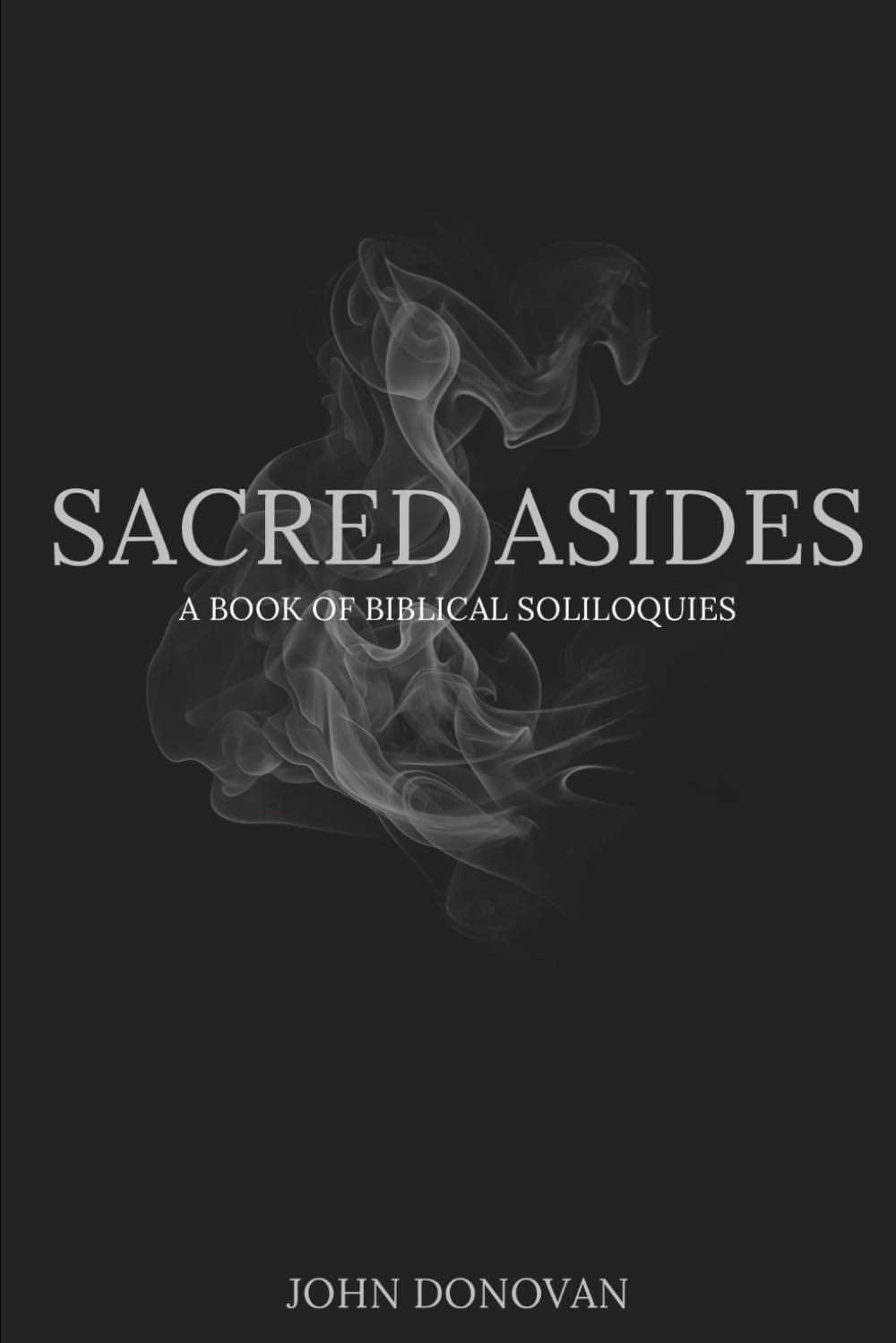New news: I was on the News, again!
I had the privilege of being asked over to WZZM’s “13 on your side” today and had a blast talking with Tanner and Sam about my book, Sacred Asides. We also covered the writing process, Thespis, improv and more!
I’ll share the link when it’s up.
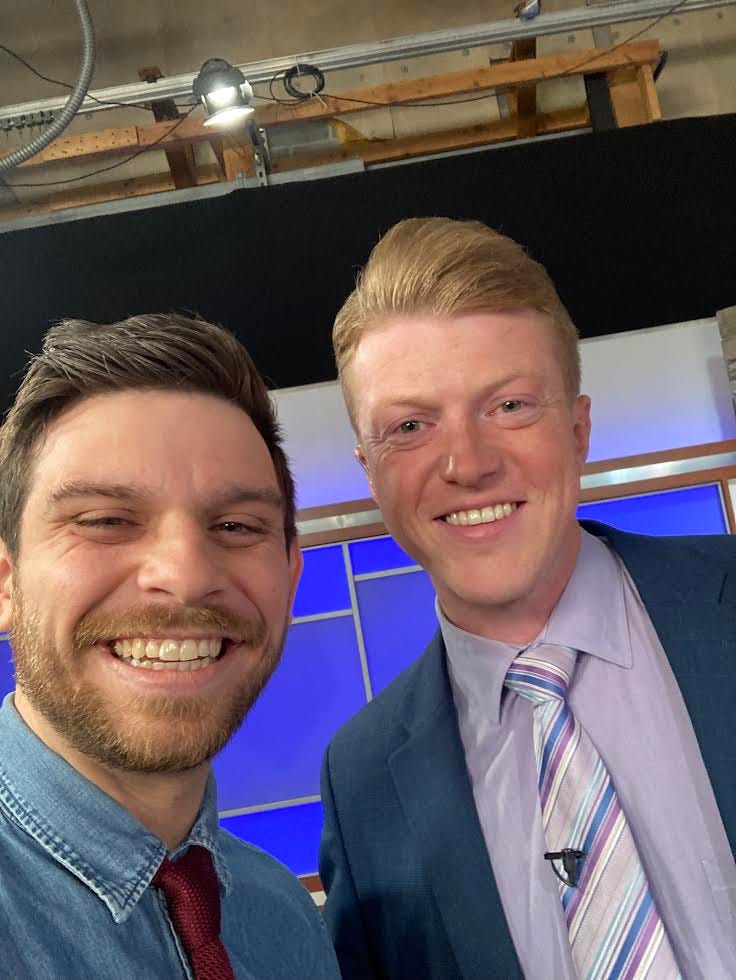
Scroll all the way to the bottom for:
1. Information on my upcoming Book Signing
2. Links to get your copy of Sacred Asides
Have trouble reading poetry?
It’s meant to be read aloud!
Click below to listen along as you read.
Introduction
In “A Good Man is Hard to Find,” Flannery O’Connor lays it out in clear terms: either Jesus did what he said, or he didn’t. If he did, there’s nothing for you to do but set aside everything and follow him. It’s not a comfortable reality, but a question that demands everyone to take a side: is he God? Can he heal? Will you actually give your life to him?
A lot of people believe in Jesus, but just how real is he to them, beyond being someone you ask for favors; someone to apologize to when you feels guilty; or just a really great teacher, instead of God, with infinite supernatural power; a real person, a real personality, that is looking at you right now, and has thoughts and feelings about you, instead of a just being a vague force or idea that you can forget about when it’s convenient?
The paralytic faces such a question in this poem. People often laugh at the question Jesus asks, “Do you want to be healed?” He can’t walk. Of course he wants to be healed.
But does he? Would you?
Before you answer, consider this: once your body has been healed supernaturally, there’s no doubt allowed. Not really. The God you believe in- and really truly do believe in- is more real than you could have imagined. And everything is true. There really is no doubt about it now. There is no half-committing. It will change everything in your life. It will change you. Are you ready for the death of yourself? It’s not always pleasant.
The paralytic fears what his life would be like once this desire, which has marked his entire thirty-eight years of life, has been granted. Accomplishing the goal of a journey ends one’s status as a pilgrim. In effect: getting what you want changes who you are. He can no longer be a victim, justified in his bitterness towards life, or other people. He gets his legs, but he must give up a lot for them that he may not want to give up: favorite sins. Malice, hatred, bitterness, complaining, judging others… They are all tempting to us because we like them. We sin because we want to sin. It feels good.
If Jesus heals the man he also takes the reason for the man’s bitterness, resentment, hatred, and more. When asked if he’d liked to be healed, the sick man complains that no one helps him into the pool of Bethesda, a place where superstition held that one could be healed. If he’s healed by the pool, great: he’s not beholden to anyone. If he’s healed by Jesus, he can’t complain anymore. He is not so certain he wants freedom from these sins, even if it gets him what he wants.
Consider St. Augustus’ Confessions, where he recounts a similar obstacle to conversion: “Grant me chastity and continency, but not yet…. For I was afraid lest You should hear me soon, and soon deliver me from the disease of concupiscence, which I desired to have satisfied rather than extinguished…. The very toys of toys, and vanities of vanities, my old mistresses, still enthralled me; they shook my fleshly garment, and whispered softly, Do you part with us? And from that moment shall we no more be with you for ever? And from that moment shall not this or that be lawful for you for ever? …What impurities did they suggest! What shame! …Yet they did delay me, so that I hesitated to burst and shake myself free from them, and to leap over whither I was called — an unruly habit saying to me, Do you think you can live without them?”
The inner conflict is fictional: there is no biblical basis to believe the man felt this way. But it’s what I would have felt.
Jesus offers healing to a man who is paralyzed, who is not so sure he wants to be healed.
John 5:1-9
Afraid of joy, my heart to sorrow sank
At thought of reckless gaiety and mirth.
“Is this your wish, to be made well?” He asked
Me, staring deep. Those well-deep eyes that would
Not let me go, unlike the rest, who sigh
And look me not, but walk (and walking mock!)
To help me not. The weightful gaze let not
Me leave, examined every crook. Had I
The legs, I’d still immobile lie.
“I’ll ask
Again: is wellness what you want? You’ve heard
Of me and what I do, believe this can
Be done.” The word once spoke is no more said,
‘Tis there for those to hear, decision’s all
Now left, and that part’s left -alas!- to me.
Deferred desire did drive my life, what’s mine
Should it be gone? In journey’s end, too ends
The pilgrim self. I knew he would, with word
Restore my legs, but disability
In company would flee. He’d give my legs
But then the bill comes due, for I would lose
Depressive, hateful cries. The scornful eye,
The mutt’ring lips; the poorly treated soul,
Now crusty with the years (with years!) as grief
On grief, despair on bitter layer thick.
And this he’d take and leave me to be free.
More terror than of vilest things and rank,
Is joy and lightness o’er the things of earth.
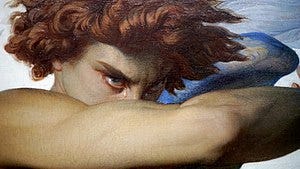
So answering, and in delay, I said
The names of all who hurt and made things hell;
Who helped me not, but pushed aside: the fiends
Who selfish sought their goods, forsaking friends
In clawful fight, and drowning urge. The cheats!
Do give me something else: what I’d require!
And drift me in Bethesda’s bath, let this
Your present gift contain and not ‘now rise.’
“If I’d have bid you crawl the land, until
To Jordan’s banks; and there but bath not once
But seven times, then you’d begin the trek
Immediately, why wait and crawl, when now
I’d bid you stand and walk, take home your mat?
If natur’lly across time’s length, thou’d like
For what thou seek, what diff’rence, then, with grace?”
Far easier still than life is to be dead,
And harder weight to carry, to be well.
What pain it is, o levity’s great groan,
To stretch joy’s legs and carry home the mat.
Afraid of joy, I couldn’t answer him;
That joy demanded total devotion.
What would it mean to stand before the Lord?
If miracles, the fancy childish thing
Which halfway disbelief had claimed then stormed
Into my life, I could not Heaven shirk.
If it were so that if the God I begged
In Psalm and tearful rage, came presently
And touched my wounds, and touching take them all,
Then nothing left- no nothing left!- but death
To what I was. Oh come not, God! And leave
Me well-known pain, my companion since youth.
But now’s the hour, the Lord’s own day for me.
And now the visitation’s here and who
Can stand within refining flames unharmed?
Once asked he asks no more, but asking waits
Until his call to life -to pained self death-
Is answered yay or nay. Oh why’d he ask
And not leave me alone? But then those eyes,
The well-deep eyes.
“It is.” say I.
“Then rise.
Upon your arms, your mat. Now rise, come home.”
Book Signing this Saturday, April 5
That’s right: very exciting news! I’ll be at Roots Brew Shop in Grand Rapids from 7:30AM-12:00 selling and signing books. See you there!
Today’s poem comes from my new book Sacred Asides, available in paperback and electronically. This edition features copious annotations that will assist in your understanding of the text. I also offer a cheaper version of the book, which features only the introductions and poems, no annotations, in paperback and electronically.
Get your copy today and thanks for your support. Please share with friends and family who you know would get a lot from this book.




